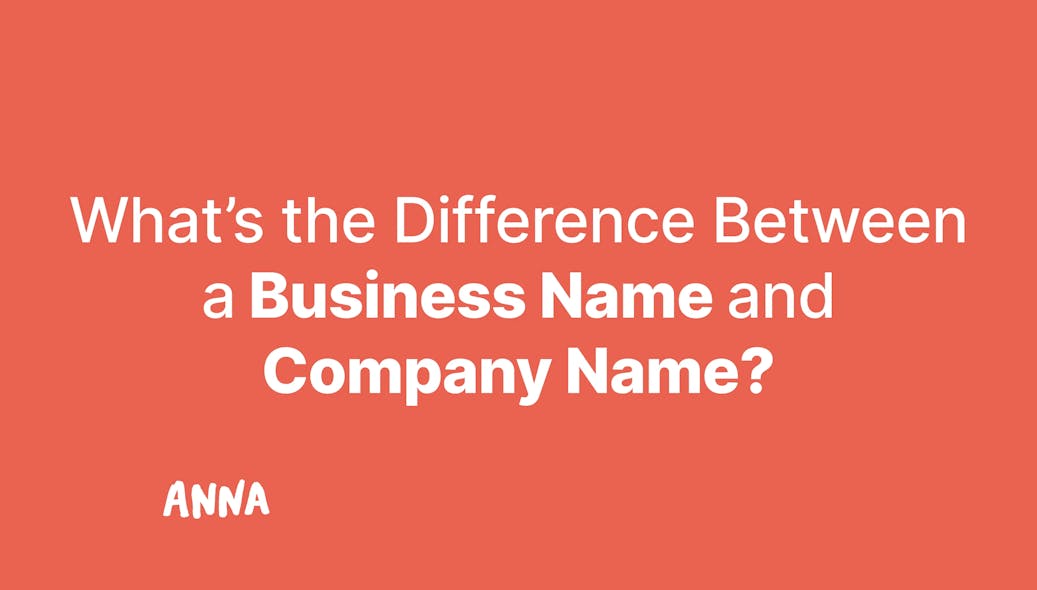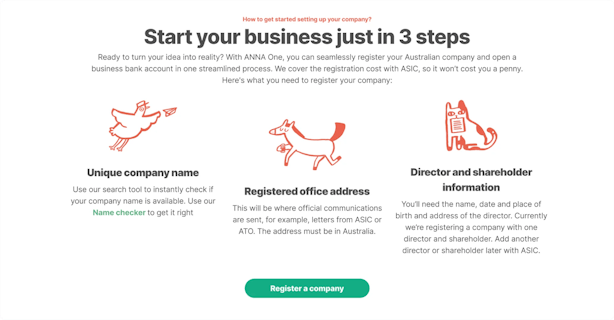
What’s the Difference Between a Business Name and Company Name?


Discover the difference between a business name and a company name to understand their roles and legal requirements before starting your business.

- In this article
- The Essentials: Business Name vs. Company Name
- Why Your Business Name Matters in 2024
- The Evolution of Trading Names
- The Importance of Registering Your Business Name
- The Truth About Ownership: Registering Doesn’t Equal Exclusive Rights
- Registering Your Logo: A Separate Process
- How to Register a Business Name with ASIC
- How To Register a Company Name with ANNA?
- Final Thoughts
Venturing into the business world can feel like trying to decode a secret language, especially about the difference between a business name and a company name and other essentials of naming your business. But don't worry – we're here to cut through the confusion. Let's clear up some common misconceptions below!
The Essentials: Business Name vs. Company Name
Let's start with the basics – understanding the fundamental differences between a business name and a company name. These terms are often used interchangeably, but they represent distinct concepts that are crucial for your business's legal and operational identity.
What Is a Business Name?
A business name is essentially the name under which your venture operates. It's the public-facing identity of your business, the name your customers will see on your signage, website, and marketing materials.
Key Points:
- Public Identity: Your business name is how the public will recognize and remember your business.
- Mandatory Registration: In Australia, you must register your business name with the Australian Securities and Investments Commission (ASIC) unless you operate under your own legal name or fall into a specific exemption category.
- Example: If Jane Doe operates a bakery under the name "Doe's Delights," "Doe's Delights" is her business name.
What Is a Company Name?
On the other hand, a company name is the official legal name of a company registered as a separate legal entity. When you register a company, it becomes its own "person," in the eyes of the law, capable of owning property, entering contracts, incurring debt, and more.
Key Points:
- Legal Entity: A company name represents a legal entity with its rights and responsibilities separate from those of its owners.
- Specific Naming Rules: In Australia, company names often include terms like "Pty Ltd" (proprietary limited) or "Ltd" (limited) to indicate their legal status.
- Example: "Doe's Delights Pty Ltd" would be the company name if Jane Doe decided to incorporate her bakery as a private company.

Why Your Business Name Matters in 2024
No matter what year it is, naming your business is an essential step in building a successful venture. In 2024, with the digital marketplace growing and brand competition intensifying, your business name carries even more weight. Here's why:
1. Brand Identity and Recognition
Your business name is the foundation of your brand identity. It's the first thing customers notice and often what they remember most about your business.
- First Impressions: Your business name sets the tone for your brand. It communicates what you do, your values, and your target audience.
- Consistency: A strong, consistent business name across all platforms – online, in-store, and on marketing materials – helps build brand recognition and trust.
- Example: "Doe's Delights" clearly conveys that Jane's business is likely a bakery or dessert shop, setting expectations for her customers.
2. Legal and Operational Impact
Your business name isn't just about branding – it also has significant legal and operational implications.
- Legal Requirements: In Australia, registering your business name with ASIC is mandatory unless an exemption applies. Failure to do so can result in fines and legal issues.
- Operational Efficiency: Your business name is used in contracts, banking, and official correspondence. A well-chosen name simplifies these processes and ensures legal compliance.
3. Growth and Scalability
A well-thought-out business name can also pave the way for future growth.
- Expansion: If you plan to expand into new markets or product lines, your business name should be broad enough to accommodate this growth without confusing your customers.
- Franchising: A strong business name can be a valuable asset if you decide to franchise your business, helping attract franchisees and customers alike.
4. Customer Perception and Loyalty
Your business name plays a crucial role in how customers perceive your brand and whether they remain loyal to it.
- Trustworthiness: A professional and relevant business name can instill confidence in potential customers, encouraging them to choose your services over competitors.
- Emotional Connection: A memorable business name can help build an emotional connection with your audience, fostering customer loyalty and repeat business.
The Evolution of Trading Names
In the past, businesses in Australia could operate under a "trading name" without registering it officially. However, this changed with the introduction of the National Business Names Register in 2012.
Before 2012: The Era of Trading Names
- What Was a Trading Name? Before 2012, a trading name was simply the name under which a business operated without the need for official registration. It was listed on the Australian Business Register (ABR) linked to the business's Australian Business Number (ABN).
- Lack of Legal Protection: Trading names didn't offer the legal protections or rights that come with a registered business name or trademark, leaving businesses vulnerable to disputes.
After 2012: The New Rules
- National Business Names Register: Since May 2012, all businesses in Australia are required to register their names with the National Business Names Register, managed by ASIC. This change aimed to streamline business naming regulations and provide a clearer, more consistent system.
- Trading Names Today: The term "trading name" is no longer officially recognized. However, some businesses still use it colloquially to refer to their registered business name.
What If I Still Have a Trading Name Listed?
If your ABN still displays an outdated trading name, it's important to update it. You can do this by contacting the ABR and registering your business name through ASIC if you haven't already done so.
The Importance of Registering Your Business Name
Now that we've established the importance of choosing a business name let's discuss the registration process. Registering your business name is a legal requirement in Australia, but it also offers several benefits that go beyond mere compliance.
When Should You Register Your Business Name?
In most cases, you should register your business name as soon as you decide to start your business. This is crucial for ensuring that your business is legally recognized and that you can operate without issues.
Exceptions to Registration
There are a few scenarios where you may not need to register your business name:
- Sole Traders/Individuals: If you operate under your own legal name (e.g., "Emily Brown" running a consultancy as "Emily Brown"), you don't need to register a separate business name.
- Partnerships: Registration isn't required if the business name is the same as the legal names of the partners.
- Registered Companies: If your company name (e.g., "Doe's Delights Pty Ltd") is the same as your operating name, you're covered by the company registration.
Benefits of Registration
Here are some benefits of registering a company in Australia:
- Legal Compliance: Registering your business name ensures you comply with Australian law, avoiding fines and legal complications.
- Brand Protection: While registering your business name doesn't automatically protect it from being used by others, it's the first step in establishing your brand. To secure exclusive rights, you'll need to trademark your name.
- Professionalism: A registered business name adds legitimacy and professionalism to your business, making it more appealing to customers and partners.
The Truth About Ownership: Registering Doesn’t Equal Exclusive Rights
A common misconception is that registering your business name gives you exclusive ownership of that name. In reality, registration alone does not prevent others from using the same or a similar name. Here's what you need to know about protecting your business name and logo:
Trade Marks: The Key to Ownership
To ensure you have exclusive rights to your business name and logo, you should register them as trademarks. A trademark gives you the legal authority to prevent others from using your name or logo in a way that could confuse customers or damage your brand.
Unregistered Rights
In some cases, simply using a business name over time can grant you certain rights, known as an "unregistered trademark." However, these rights are limited and harder to enforce compared to a registered trademark.
Why You Should Register a Trademark
- Legal Protection: A registered trademark offers clear legal protection, making it easier to take action against infringers.
- Market Presence: Having a registered trademark can enhance your brand's value and market presence, signaling to customers and competitors that you're serious about your business.
- Peace of Mind: Registering your trademark gives you peace of mind, knowing that your brand identity is legally protected.
How to Register a Trademark
- Search Existing Trade Marks: Before you apply, use the IP Australia Trade Mark Search tool to ensure your desired name or logo isn't already trademarked.
- Prepare Your Application: Gather all necessary information and documents. This includes a clear representation of your logo if you're trademarking one.
- Submit Your Application: Complete the application process through the IP Australia website. The process involves fees and can take several months, so it's important to start early.
Registering Your Logo: A Separate Process
Creating a logo is a crucial step in establishing your business's visual identity. However, just like your business name, your logo isn't automatically protected when you register your business or company name.
Why Your Logo Needs Its Own Protection
- Visual Identity: Your logo is a vital part of your brand's visual identity. It appears on your website, packaging, and marketing materials, making it crucial to protect.
- Trademarking: To protect your logo from being copied or used by others, you need to register it as a trademark. This process is separate from registering your business or company name but just as important.
Steps to Protect Your Logo
- Design Your Logo: Ensure your logo is unique and represents your brand's identity. Avoid designs that could be easily confused with existing logos.
- Search for Similar Logos: Before applying for a trademark, use the IP Australia Trade Mark Search tool to check for similar existing trademarks.
- Register Your Logo: Submit your logo for trademark registration through IP Australia. This will grant you exclusive rights to use your logo in your business activities.
How to Register a Business Name with ASIC
Registering your business name in Australia is a relatively straightforward process, but it's important to follow the steps correctly to avoid any issues. Here's a step-by-step guide:
Step 1: Check Name Availability
Before registering your business name, you need to ensure that it's available and not already in use by another business. You can do this by searching the ASIC website.
Step 2: Register Through the Business Registration Service
Once you've confirmed the availability of your desired name, you can register it online through the Business Registration Service (BRS) provided by ASIC.
- Complete the Online Form: Provide all required information, including your ABN, business address, and contact details.
- Choose Your Registration Period: You can choose to register your business name for one or three years, depending on your preference.
- Pay the Fee: The registration process involves a fee, which you can pay online during the application.
Step 3: Confirmation and Use
After submitting your application, ASIC will review it and, if everything is in order, approve your business name registration. You'll receive confirmation via email, and your business name will be officially registered.
Step 4: Maintain Your Registration
Keep in mind that you'll need to renew your business name registration periodically (every one or three years, depending on your initial choice). Failing to renew your registration can result in your business name being canceled.
How To Register a Company Name with ANNA?
Registering your company name with ANNA is a straightforward process that comes with tons of benefits. Here's how to do it, step by step:
📝 Choose a Unique Name:
- Use ANNA's search tool to check if your desired company name is available.
- Make sure the name is unique and represents your brand well.
🏠 Provide a Registered Office Address:
- Enter an Australian address where official communications (like letters from ASIC) will be sent.
- This address must be in Australia, and it must be a real, physical location.
👤 Enter Director and Shareholder Details:
- Provide the name, date of birth, place of birth, and residential address of the company's director and shareholder.
✅ Check Availability and Register:
- Use the ANNA tool to check name availability.
- If the name is available, proceed with registration by submitting your details.
💳 Set Up Your Business Account:
- Once registered, open an ANNA business account to manage your bookkeeping, invoicing, GST, and company taxes.
⚡ Exciting news! Soon, you'll be able to register your business name with ease through our upcoming ABN registration service. Whether you want to operate under a different name than your company's registered name or you're starting a new venture, this service will make it simple to secure your business name legally!
Final Thoughts
Naming your business is one of the most important decisions you'll make as an entrepreneur. It's not just about what sounds good or looks appealing – your business name has legal, operational, and branding implications that can impact your success.
Here's a quick recap:
- Understanding the Difference: A business name is how your venture is publicly recognized, while a company name represents a separate legal entity.
- Legal Requirements: Registering your business name with ASIC is mandatory, and it's essential to ensure your name is legally protected by registering it as a trademark.
- Logo Protection: Your logo requires separate trademark registration to be fully protected.
- No More Trading Names: Since 2012, all business names must be registered with ASIC; trading names are no longer recognized.
As you move forward with naming and registering your business, consider consulting with a legal expert to ensure you're making the best decisions for your business's future.
A well-chosen and protected name can set you on the path to long-term success.
ANNA's comprehensive financial management solution is an invaluable asset for Australian business owners, seamlessly combining technology and expertise to meet your unique needs.

Key benefits of ANNA for business finance management:
✔️ Hassle-free company registration.
✔️ Smart document storage to effortlessly manage receipts and invoices.
✔️ Automated tax calculations to keep on top of your tax obligations with ease.
✔️ Personalized tax calendar so you would never miss a critical deadline.
✔️ Real-time financial insights for making informed decisions with up-to-date financial data.
✔️ Expert accountant support with tailored guidance.
Ready to ditch pileworks of papers and streamline your operations?
Sign up for ANNA today and discover how smart financial management can transform your business today!






